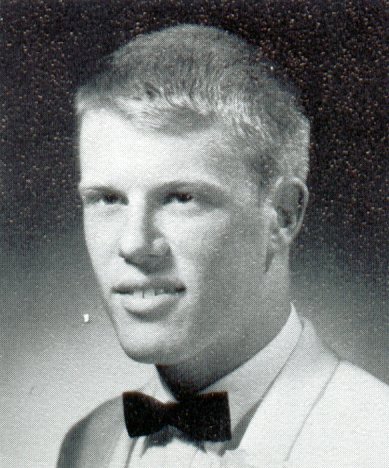
John Modlin - 1963
*Update* Friday
September 13, 2013
Update for 50th
Reunion
Bio from 40th Reunion
November 25,
2002 People Magazine article
Update August 29, 2008
John Modlin
- 2003-08-18 (addition 2008-08-29)
I left Columbia before our graduation
ceremony and senior prom because of a summer job in northern Michigan and,
except the summer of 1967 when my father died, I have returned for only
very brief visits to my mother who moved to Colorado in 1969 and returned
to Columbia in 1978. Mom died last year at the age of 86. My sister, Susan,
and I arranged a memorial service for her last December at the UM Faculty
Club where we were pleased to see Doug Miller, Jim Bryan, and Charley Blackmore
among the guests. I have been in regular touch with Doug and his wife Jody
over the years, but have not been very good in keeping up with most everyone
else in our class. I have followed George Poehlman’s medical career with
admiration and exchanged a number of emails with him the past 10-15 years.
After high school, I enrolled at
Duke University. But this was before the days of the Cameron Crazies and
thus I never had the opportunity to strip to the waist and wear blue and
white paint at basketball games. I spent eight years in Durham and left
with both AB and MD degrees. Influential medical school professors and
role models convinced me my future was in infectious diseases, so I abandoned
my original plan to become a surgeon, and started a residency in Pediatrics
at the Children’s Hospital in Boston in 1971.The rich mix of history, culture,
social life and professional opportunity in Boston was compelling to this
kid who had never strayed far from small cities in the Midwest and South,
and I wound up staying there through pediatric residency training, an infectious
disease fellowship, and a few years as a junior faculty member at Harvard
Medical School.
Some early research successes in
studying perinatal viral infections led to opportunities at other medical
schools. I hated to leave Boston, but I couldn’t deny the offer from Johns
Hopkins when in came along, so I took a position there in the Department
of Pediatrics where I continued my laboratory work, studied patients with
viral meningitis, and became deeply involved with AIDS that was just emerging
in children in inner cities, including Baltimore. I joined with colleagues
at Harvard, Duke, and elsewhere to design treatment programs for children
with HIV infection, the most successful of which prevented the transmission
of the virus from infected mothers to their newborn infants and led to
the marked reduction in new pediatric AIDS cases. Johns Hopkins is an exciting
and stimulating place to work because of the immense scientific and medical
talent the institution attracts. (It is continuously ranked the nation’s
best hospital by US News and World Report).
However, for many reasons, Baltimore
proved to be a difficult place to raise a young family, so for purely personal
reasons, in 1991, I accepted an offer from a colleague and good friend
to go north and start a program in pediatric infectious diseases and clinical
virology at Dartmouth Medical School in Hanover, NH. Dartmouth has neither
the
size nor the prestige of Harvard or Hopkins, but it certainly ranks among
the very best small medical schools because of a diverse, accomplished
student body and strong research credentials. I continued my laboratory
research and participated in the usual clinical and educational activities
at Dartmouth and, in 1999, took the position of Chair of the Department
of Pediatrics at DMS and Medical Director of the Children’s Hospital at
Dartmouth.
I have had career long interests
in viral diseases and vaccines. During the past decade I have participated
on a number of committees and worked closely with the CDC, FDA, NIH and
other federal agencies in developing public policy on immunization issues
ranging from influenza to smallpox.
My wife, Sharyn, is a former advertising
executive. We met in Boston and were married in 1983. Our two children,
Andrew, now 16, and Chelsea, now 13, were both born in Baltimore. The kids
both attend private schools in New England and spend the summers at our
vacation home in Michigan, the same place I ran away to in 1963. The entire
family has a passion for sailboats and racing sailboats, snow skiing, and
winter vacations in the Caribbean, usually on a sailboat.
New info
2008-08-29
See Story from "People Magazine"
November 25, 2002
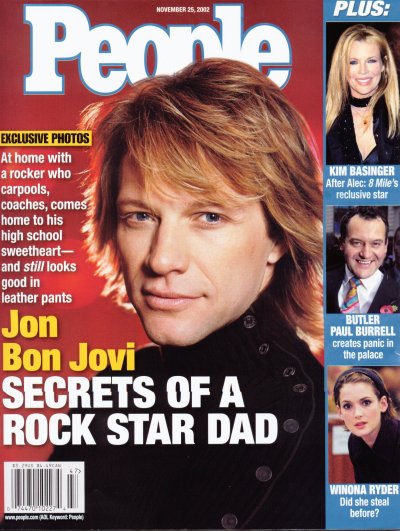
See article "In His Own Words" (Taken
from Nov 25, 2002 Issue of People)
Dr. John Modlin weighs the dangers of a smallpox attack--and the
vaccine meant to fight it
Read Story
or
Back to Directory
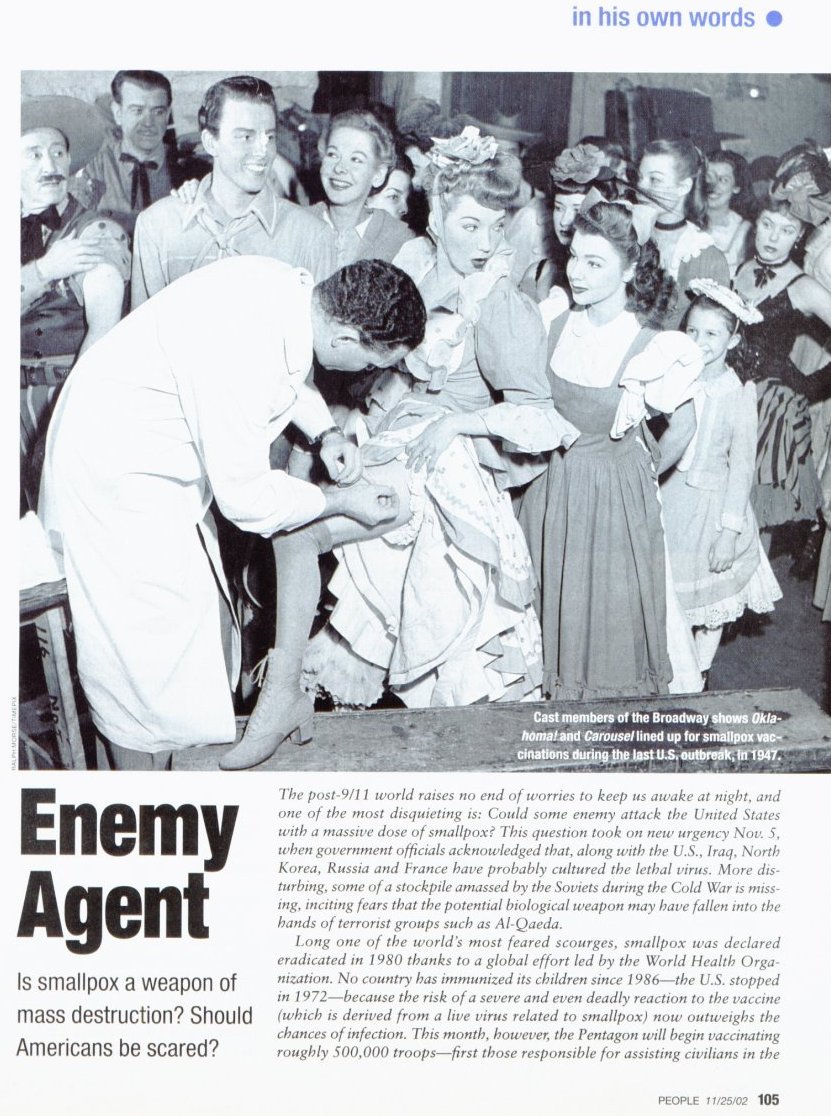
To Next Page
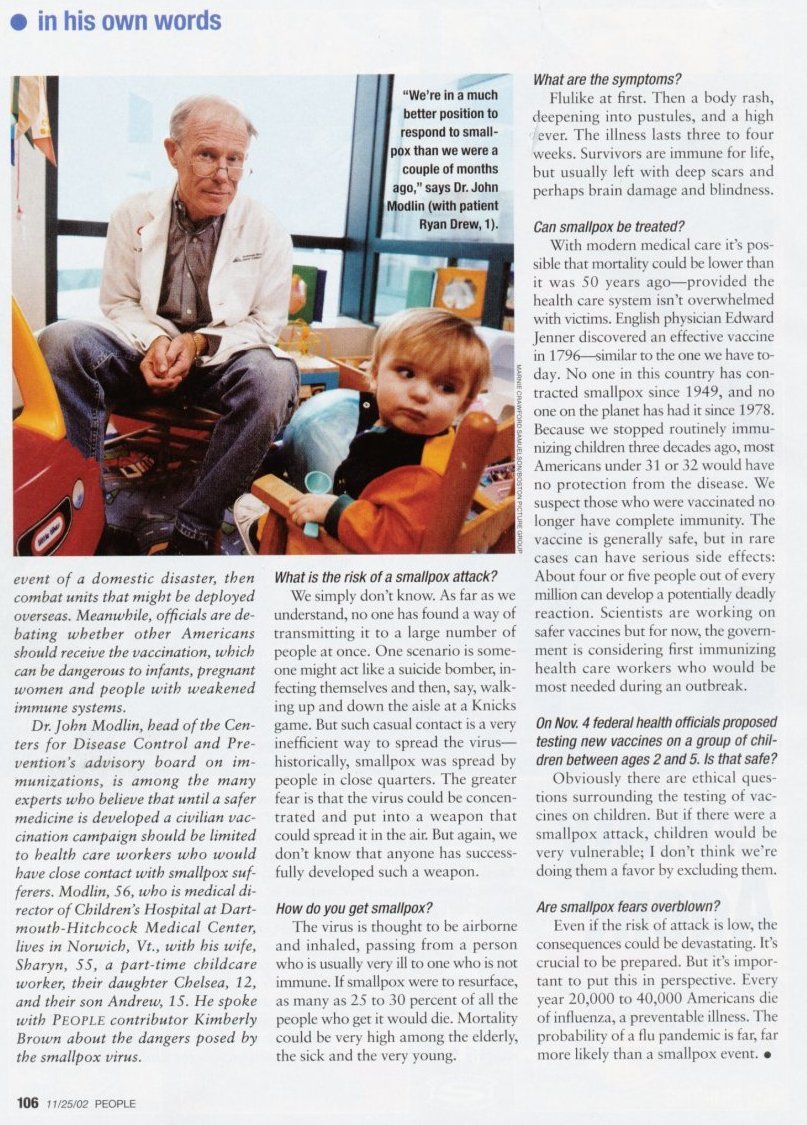
Dr. John F. Modlin is Professor of Pediatrics and Medicine, Chair of
the Department of Pediatrics at Dartmouth Medical School, and Medical Director
of the Children’s Hospital at Dartmouth. He is also a member of the Infectious
Disease Section at the Dartmouth-Hitchcock Medical Center in Lebanon, New
Hampshire. He received both the AB (1967) and MD (1971) degrees from Duke
University. His pediatric internship and residency were performed at the
Children's Hospital in Boston between 1971 and 1973, including a year at
St. Mary's Hospital in London. After two years of service with the Epidemic
Intelligence Service at the Centers for Disease Control, he returned to
Boston in 1975 to complete his residency and infectious disease fellowship.
From 1978 to 1983 he was a member of the faculty of Harvard Medical School
and an Assistant in Infectious Diseases at the Children's Hospital in Boston.
Dr. Modlin moved to Johns Hopkins in 1983 where he headed the Pediatric
AIDS Clinical Trials Program and subsequently moved to Dartmouth in 1991
in order to continue his research on enterovirus diseases. At Dartmouth,
he was appointed Acting Department Chair in 1999 and Department Chair in
2001.
Dr. Modlin’s research and academic interests include perinatal viral
infections, poliovirus immunization, and vaccine public policy. His initial
clinical and experimental studies focused on the pathophysiology of enterovirus
infections, especially infections transmitted from mother to infant. In
the 1980s he led and/or contributed to a number of HIV treatment trials
as a member of the Pediatric AIDS Clinical Trials Group, including the
pivotal 049 and 076 studies. During this time he also helped to design
and conduct clinical studies of enhanced potency inactivated poliovirus
vaccine in combination with OPV and studied the effects of these vaccines
on vaccine poliovirus excretion as a measure of intestinal immunity. These
studies were instrumental in the decision to change polio vaccination policy
in the United States in 1997 and again in 2000.
Dr. Modlin has authored or co-authored more than 200 papers in the medical
literature. He has served as Vice-Chair of the Pediatric AIDS Clinical
Trials Group Executive Committee and as Chair of the FDA Antiviral Drugs
Advisory Committee. From 1997 to 2003 he was Chair of the CDC Advisory
Committee on Immunization Practices during a tumultuous period in which
the ACIP faced several contentious issues including mercury in childhood
vaccines, intussusception as a complication of tetravalent rhesus rotavirus
vaccine, emergency use of anthrax vaccine, and re-institution of smallpox
vaccine for military personnel and certain health care workers. Dr. Modlin
currently is a member of the FDA Vaccines and Related Biological Products
Advisory Committee.
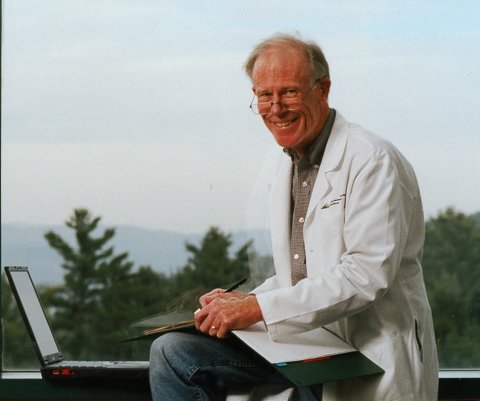
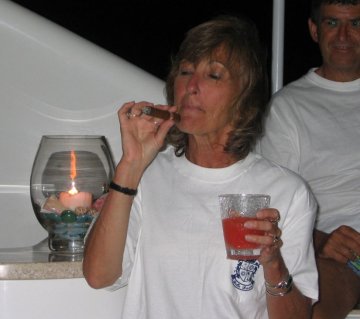 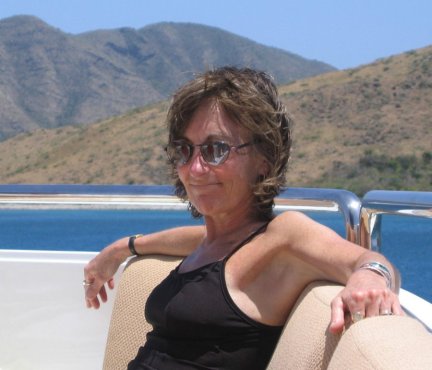
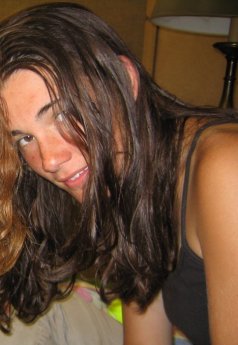 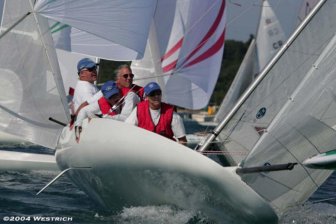
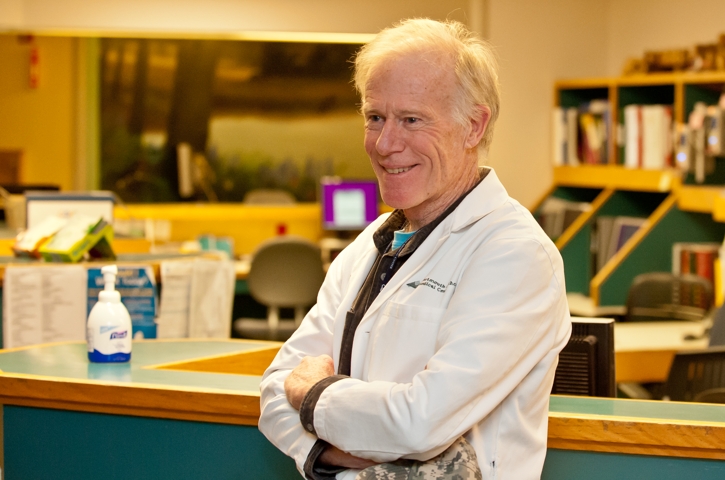
****************************************************
Thanks John you were the 1st in the Class of
'63 to take the time to actually answer all my questions and send an
up-to-date picture! I appreciate you and your support..... I need you
here in Columbia helping me put this thing together! You are the "MAN",
John Modlin, Doc, thanks for your continued presence as a great
"Kewpie!" Charley
What I need for the Virtual Memory Book from
you:
1) Pictures; at least one old picture from
high school and a current picture of yourself And any other pictures; as
many as you want to send of you and your family.
Pictures taken from grade school through
Hickman HS would be exceptional KooL!!!!!
2) Something about
your origin; why, when and how you wound up in Columbia and where you
came from if not born in Columbia.
I was born in St. Louis and came to Columbia
with my family in 1947. My father was a surgeon who completed his
residency at Barnes Hospital in St. Louis after a tour of duty in
Africa, Italy and France during WWII. He came to take a job at Ellis
Fischel Cancer Hospital and later maintained a private practice and
served as Chair of the Department of Surgery at the University of
Missouri School of Medicine. My mother was originally a nurse who grew
up near Springfield.
3) What did you do immediately after you left
high school in 1963 and where did you go if you left Columbia?
I enrolled at Duke University.
4) Tell me about your education and what your
profession is or how you acquired your occupation and something about
it.
I am
attaching the brief biography I use for professional reasons.
5) Are you still working and if so what are
you doing?
See
bio.
6) Are you
retired and what are you doing/have done since you retired? How long
have you been retired?
Nope. Still going full blast. See bio.
7) Are you married? Who are you married to?
Who are you divorced from? How did you meet your spouse or partner;
where and when? How long have you been married?
Sharyn and I were
married in 1983 – my first, her second. We met at the Harvard Club in
downtown Boston on a blind date arranged by a mutual friend. Sharyn was
working in the advertising industry and I was a junior faculty member at
Harvard Medical School and Boston Children’s Hospital. We were married 6
months later at our summer home in Michigan. After our August wedding,
Sharyn was called back to her home office in Philadelphia and I was
recruited to Johns Hopkins in Baltimore. We set up our first home
together near Annapolis, Maryland but lived apart for 2 years. We later
moved to Baltimore where both our children were born. In 1991 we moved
to northern New England and have had homes in both Vermont and New
Hampshire. Now that both our kids have left the nest, we are living
apart again.
8) How many children do you have? When was
your first child born? When was your last child born? How many
grandchildren do you have and when was the oldest one born?
Andrew in 1986 and Chelsea in 1990. Andrew now
works for the US Geological Survey and is living with his girlfriend in
Nevada. Chelsea will graduate from Carleton College in June and plans to
apply to medical school.
9) What countries have
you spent time in other than on business? What countries have you lived
in outside the US?
I spent a year in London at St. Mary’s
Hospital during my pediatric residency in 1972 and 1973.
10) Tell me what's on
your 'Bucket List' and tell what you have and haven't done so far.
Become fluent in another language.
To see poliomyelitis eradicated globally
before I retire.
11) Are you a veteran and if so where and when
you served our country?
I served 2 years in the US Public Health
Service assigned to the Centers for Disease Control and Prevention in
Atlanta from 1973 to 1975.
12) What is the most
vivid memory you have from Hickman High School? What is worst memory?
What is your best memory?
Candidly, my high school days were not the
best time of my life. My strongest memory is the wish to get away from
Columbia as soon as possible. I skipped the Senior Prom and left for a
job in Michigan the day after graduation.
13) What was your
favorite place to go after school or on weekends in Columbia when
attending Hickman?
14) Who was your
favorite teacher at Hickman? Who would you like to see the most from the
Hickman faculty?
Probably Jim Ritter, although Nell Kitchens
was certainly the most memorable.
15) What person from
our class have you stayed in closest contact with since you left
Hickman?
Doug
Miller and George Poehlman
16) Are you still in
touch with 6 or more of our classmates and if so give me their name and
their email, address and phone number?
No
17) Tell me something
that you have told one of your children or grandchildren that was
something you learned or did at Hickman?
18) Share any memory
you have of your earliest recollections of places, people or things in
Columbia?
A
stretch here. Doug Miller, Rick Waggoner and I were friends from our
pre-school days due to the close friendships among our parents. We lived
in two homes on Edgewood and my earliest memories of neighbors and
friends are from that time.
19) What was your
biggest accomplishment before you graduated from Hickman High School and
what has been your biggest accomplishment since you graduated from
Hickman until now?
I’ve never thought of the first question.
Athletically, I did well in tennis at the conference and regional levels
and ran on a school record setting mile relay team my senior year.
I consider my greatest accomplishment my two
kids who have turned out to be fantastic human beings. Of course, I take
all the credit here. I don’t recall feeling doing anything very
accomplished until I got to medical school where my professional
interests began to develop. As a physician and scientist, I contributed
by conceptualizing and conducting studies to prevent perinatal
transmission of HIV and to many areas involving viral vaccines. The past
12 years I have built a department of pediatrics which is now highly
regarded nationally.
20) What do you think
classmates will remember the most about you the at the 50th reunion?
I’ll be happy if they just remember me.
Biography
Dr. John F. Modlin is Professor of Pediatrics
and Medicine, Chair of the Department of Pediatrics, Interim Director of
the Children’s Hospital at Dartmouth, and Senior Associate Dean for
Clinical Affairs at Dartmouth Medical School. He is also a member of the
Infectious Disease Section at the Dartmouth-Hitchcock Medical Center in
Lebanon, New Hampshire. He received both the AB (1967) and MD (1971)
degrees from Duke University. His pediatric internship and residency
were performed at the Children's Hospital in Boston between 1971 and
1973, including a year at St. Mary's Hospital in London. After two years
of service with the Epidemic Intelligence Service at the Centers for
Disease Control in Atlanta, he returned to Boston in 1975 to complete
his residency and infectious disease fellowship. From 1978 to 1983 he
was a member of the faculty of Harvard Medical School and an Assistant
in Infectious Diseases at the Children's Hospital in Boston. Dr. Modlin
moved to Johns Hopkins in 1983 where he headed the Pediatric AIDS
Clinical Trials Program and subsequently moved to Dartmouth in 1991 in
order to continue his research on enterovirus diseases. He was appointed
Acting Department Chair in 1999 and Department Chair in 2001.
As Chair, he has led a
more than two-fold expansion of the faculty and created or substantially
expanded subspecialty programs in infectious diseases, pulmonology,
gastroenterology, nephrology, rheumatology, adolescent medicine,
allergy, clinical immunology, child protection, and pediatric hospital
medicine. Under his leadership, the residency program was expanded in
2003 and developed into a model program with a board pass rate in the
top 10% of all U.S. and Canadian programs and a track record of
graduating residents who are now making meaningful contributions as
community-based and academic pediatricians throughout the country. He
also supported the growth of research in such diverse areas of health
services, cancer prevention, immunization, sudden infant death syndrome,
and obesity prevention. In 2010, the Department of Pediatrics ranked in
the top quartile of all medical school departments in NIH funding.
Dr. Modlin’s research
and academic interests include perinatal viral infections, poliovirus
immunization, global poliomyelitis eradication, and vaccine public
policy. His initial clinical and experimental studies focused on the
pathophysiology of enterovirus infections, especially infections
transmitted from mother to infant. In the 1980s he led or contributed to
a number of HIV treatment trials as a member of the Pediatric AIDS
Clinical Trials Group, including the pivotal 049 and 076 studies that
demonstrated for the first time that mother to infant transmission of
human immunodeficiency virus could be prevented by antiviral therapy.
During this time he also helped to design and conduct clinical studies
of enhanced potency inactivated poliovirus vaccine in combination with
OPV and studied the effects of these vaccines on vaccine poliovirus
excretion as a measure of intestinal immunity. These studies were
instrumental in the decision to change polio vaccination policy in the
United States in 1997 and again in 2000.
Dr. Modlin has
authored or co-authored more than 200 papers in the medical literature.
He has served as Vice-Chair of the Pediatric AIDS Clinical Trials Group
Executive Committee and as Chair of the FDA Antiviral Drugs Advisory
Committee. From 1997 to 2003 he was Chair of the CDC Advisory Committee
on Immunization Practices during a tumultuous period in which the ACIP
faced several contentious issues including mercury in childhood
vaccines, intussusception as a complication of tetravalent rhesus
rotavirus vaccine, emergency use of anthrax vaccine, and re-institution
of smallpox vaccine for military personnel and certain health care
workers. Dr. Modlin recently served as Chair of the FDA Vaccines and
Related Biological Products Advisory Committee. He is currently
assisting with separate efforts to develop a novel antiviral agent (with
the Task Force for Global Health) and an improved live oral poliovirus
vaccine (with the Bill and Melinda Gates Foundation), both designed to
assist in the WHO Global Poliomyelitis Eradication Initiative.
Dr. Modlin lives in
Grantham, New Hampshire. His wife Sharyn, is a former advertising
executive who works with child advocacy centers in New Hampshire and
Michigan. Their son, Andrew (DOB 12/21/86) is a field technician with
the United States Geological Survey and their daughter Chelsea (DOB
2/21/91) is a senior at Carleton College. They maintain a second home in
northern Michigan.
Hi
Charley-
I submitted my bio to you so long ago that I
forgot what I included on it. Regardless, I have an update. This summer
I took a leave from Dartmouth to go to work for the Bill and Melinda
Gates Foundation in Seattle to work on global polio eradication. This is
Bill Gates top global health priority and I was asked to sign on to
oversee the global polio research agenda in partnership with WHO and
CDC. It’s a new adventure and a chance to contribute to child health in
a very different way than before. George Poehlman has worked at ground
level on this and will know what it is all about.
That’s the pretext for my message. I’m going
to a meeting at WHO in Geneva on 10/7 and 10/8. I may be able to get a
flight from Europe to St. Louis or Kansas City on 10/9 in time for the
dinner that evening, taking advantage of the time difference in flying
east to west. Anyway, I’m going to try. This may be my last excuse to
return to Columbia. I’ll let you know if I succeed.
If not, please convey my best wishes for a
joyful reunion to everyone.
Warm regards,
John
John Modlin, M.D.
Deputy Director, Polio
Global Development
Bill and Melinda Gates Foundation
P.O. Box 23350
Seattle, WA 98102
Back to Directory
|






